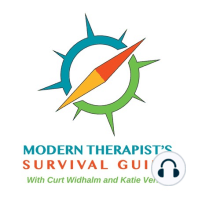34 min listen

The Risks and Consequences of Failing to Report Child Abuse
FromThe Modern Therapist's Survival Guide with Curt Widhalm and Katie Vernoy
The Risks and Consequences of Failing to Report Child Abuse
FromThe Modern Therapist's Survival Guide with Curt Widhalm and Katie Vernoy
ratings:
Length:
40 minutes
Released:
May 23, 2022
Format:
Podcast episode
Description
The Risks and Consequences of Failing to Report Child Abuse Curt and Katie discuss the CA Board of Behavioral Sciences case against Barbara Dixon, LMFT who failed to report child abuse for Gabriel Fernandez and Anthony Avalos who both subsequently died from abuse by caregivers. We look at what this therapist missed as well as appropriate child abuse reporting, including the nuance of when to report. CW: details of child abuse discussed. Transcripts for this episode will be available at mtsgpodcast.com! In this podcast episode we talk about the importance of child abuse reporting We talk about the failure to report abuse by Barbara Dixon, LMFT that has recently been in the news related to the deaths of Gabriel Fernandez and Anthony Avalos. The case related to the child abuse death of Gabriel Fernandez Content Warning: Details of the case, including the actions taken (and not taken) by Barbara Dixon, LMFT The decision-making process with child abuse reporting Who is responsible to decide to report child abuse – the clinician or the supervisor? “I hear [prelicensees] wrongly state that ‘I'm working under somebody else's license; this falls on them’ … I cannot emphasize enough that decisions like this, in [Barbara Dixon’s] case, really do indicate that it is your responsibility, no matter what your agency says… People can and do get punished for not following through on their individual licensee or registration responsibilities as mandated reporters.” – Curt Widhalm When supervisors or agencies tell clinicians under supervision not to report child abuse report The individual responsibility that each clinician holds The myth that you’re working “under” your supervisor’s license How do you decide whether you should report child abuse? “It's these gray areas where there's this nuance that I think feels really overwhelming. And for some folks, they'll lean towards reporting or consulting to identify if it's reportable. And for other folks, they use that as cover to not report when it feels too uncomfortable.” – Katie Vernoy Clarity from child abuse reporting laws Hesitation based on systemic response, the therapeutic relationship, and the paperwork hassle Where there are gray areas and nuance The consequences of failing to report child abuse or adequately document services or risks Your agency or supervisor may not be held liable for your actions (especially if you don’t document what you did) Incomplete documentation hurts – it doesn’t help you hide from liability Appropriate Child Abuse Assessment and Reporting Interviewing the child separately Following up on what you’ve asked for Understanding at what point it becomes our responsibility (i.e., having sufficient information) Documenting each stage and make sure to appropriately close out treatment file when needed Consultation and not making the decision on your own Defining the injury and assess from there Understanding normal childhood response to typical life events (and noting changes) Navigating the gray areas in child abuse assessment Looking at impact, intent, and injury Using the context to help decide when there isn’t a definitive line Adequately documenting, even when you aren’t sure you’re making the right decision, is important and necessary Looking at what needs systemic intervention and what needs family therapy Getting past the discomfort to report child abuse report It is your responsibility Taking a moment to understand the purpose of reporting Reducing your own liability Obtaining resources for families Understanding the risk for families of systems getting involved Our Generous Sponsors for this episode of the Modern Therapist’s Survival Guide: OOTify OOTify. "OOT" or "uth" (उठ) means "lift up" in the Hindi language. OOTify is a digital health solution that acts as an evidence-based hub to unify relevant mental health resources. Community, Connection, and Collaboration are critical to OOTIFY. As they lift the mental healthcare system, they ensu
Released:
May 23, 2022
Format:
Podcast episode
Titles in the series (100)
What is a Modern Therapist?: A discussion of modern psychotherapy and the challenges modern therapists face by The Modern Therapist's Survival Guide with Curt Widhalm and Katie Vernoy